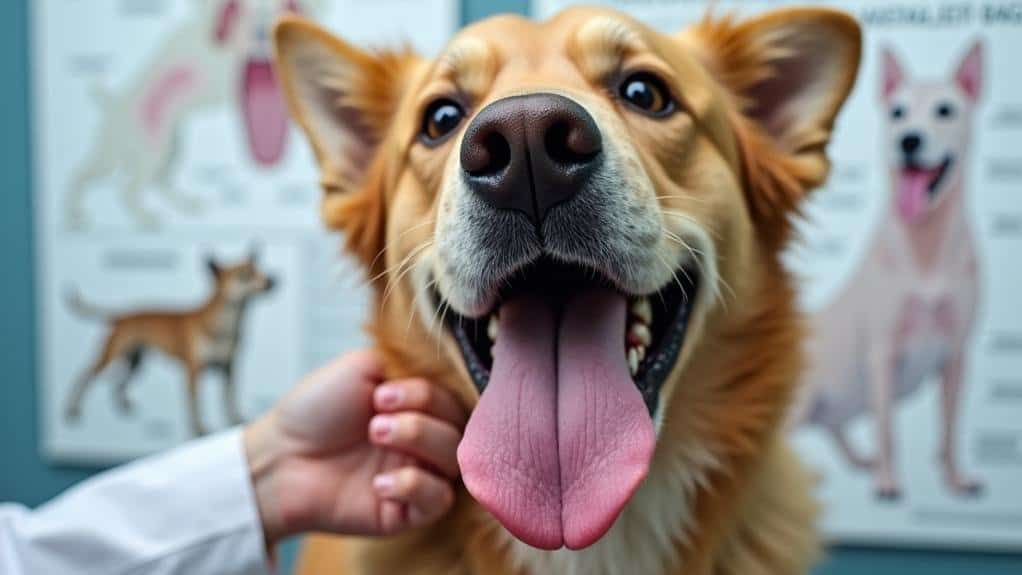Dogs stick their tongues out for various reasons. Primarily, it’s a cooling mechanism, as they lack sweat glands and rely on panting to regulate body temperature.
It can also indicate relaxation, happiness, or excitement. Some breeds are prone to tongue protrusion due to their facial structure or genetics.
However, persistent tongue sticking might signal health issues like dental problems or oral tumors.
Environmental factors, such as heat and stress, can influence this behavior.
While it’s often harmless, understanding your dog’s unique tongue behavior can provide valuable insights into their well-being and emotional state.
There’s more to discover about this common canine quirk.
Physiological Reasons for Tongue Protrusion

Dogs’ tongues are remarkable tools that serve multiple physiological purposes. When you see dogs stick their tongues out, it’s often for significant physiological reasons. One of the primary functions is as a cooling mechanism. Unlike humans, dogs don’t have sweat glands all over their bodies, so they rely on their tongues to help regulate their body temperature through evaporation.
You’ll also notice tongue protrusion when dogs are relaxed and happy. It’s a sign of contentment, especially after engaging in enjoyable activities. This behavior is more common in brachycephalic dogs due to their unique jaw structure and tongue positioning.
The tongue’s sensitivity plays an essential role in your dog’s exploration of their environment. It helps them gather information about food and surroundings through touch and taste.
Additionally, the tongue contributes to oral hygiene. The papillae on its surface help scrape food particles from teeth and gums, promoting dental health.
Understanding these physiological reasons for tongue protrusion can help you better interpret your dog’s behavior and needs, ensuring their comfort and well-being.
Emotional States and Tongue Behavior

Five key emotional states can be revealed through a dog’s tongue behavior. When you see your furry friend’s tongue sticking out, it often signals relaxation and contentment. This is especially true after enjoyable activities like playtime or walks.
A relaxed, drooping tongue during rest suggests your dog is at ease in their environment.
Quick tongue flicks can indicate excitement or anticipation. If you notice this behavior, your dog may be enthusiastic or interested in their surroundings.
On the other hand, stress or anxiety can also lead to tongue protrusion. In these cases, it’s a self-soothing behavior, highlighting your pet’s need for a calm and supportive environment.
Breed-Specific Tongue Characteristics

While tongue behavior can reveal a dog’s emotional state, it’s important to contemplate that certain breeds have unique tongue characteristics.
You’ll notice that some dogs are more prone to sticking their tongues out due to their genetic makeup and physical structure.
Brachycephalic breeds like Bulldogs and Pugs often struggle to keep their tongues fully inside their mouths. Their short noses and compressed facial features can make it challenging to close their jaws completely.
Small breeds such as Chihuahuas may also exhibit tongue protrusion due to dental issues or jaw misalignment.
You’ll find that larger breeds like Golden Retrievers have broader tongues that are more visible when they pant or relax.
On the other hand, Shih Tzus may have naturally longer tongues that tend to stick out more frequently, especially during rest.
Some dogs are affected by “hanging tongue syndrome,” a condition that causes persistent tongue protrusion. This genetic trait is more common in breeds like Cavalier King Charles Spaniels and French Bulldogs.
Understanding these breed-specific characteristics can help you better interpret your dog’s tongue behavior and guarantee proper care for their unique needs.
Health Implications of Protruding Tongues

A protruding tongue in dogs isn’t always just a cute quirk; it can sometimes signal underlying health issues. Persistent tongue protrusion, known as hanging tongue syndrome, may indicate dental diseases, oral tumors, or neurological disorders, especially in brachycephalic breeds.
If you notice your dog’s tongue sticking out frequently, it’s important to monitor for additional symptoms like excessive drooling or difficulty eating.
When observing your dog’s protruding tongue, consider these emotional aspects:
- Concern: Your furry friend might be experiencing discomfort or pain.
- Vigilance: Regular dental check-ups are vital for preventing oral health issues.
- Responsibility: Prompt veterinary evaluation can catch underlying health concerns early.
- Relief: Many tongue-related problems are treatable with proper care.
New medications can cause temporary tongue sticking, so it’s important to observe your dog closely after starting any new treatments.
If you notice persistent symptoms or changes in behavior, don’t hesitate to seek a veterinary consultation.
Environmental Factors Affecting Tongue Display

Influenced by their surroundings, dogs often display tongue-related behaviors that can reveal a lot about their environment.
When you notice your dog’s tongue hanging out, it’s crucial to reflect on the environmental factors at play. High temperatures and humidity can trigger this behavior as a cooling mechanism, with dogs using their tongues to regulate body heat.
Stressful environments, such as those with loud noises or unfamiliar settings, may cause your dog to stick out its tongue as a sign of anxiety or discomfort. Changes in routine, like introducing new pets or altering household dynamics, can also lead to tongue display as a non-confrontational gesture.
Pay attention to your dog’s hydration levels, as lack of access to fresh water can result in excessive panting and tongue sticking. This behavior indicates your pet’s attempt to cool down and alleviate discomfort.
Additionally, exposure to allergens or irritants in the environment may cause oral discomfort, prompting unusual tongue behavior as dogs try to self-soothe.
Training and Managing Tongue Behaviors

Building on our understanding of environmental influences, let’s explore how to effectively train and manage your dog’s tongue behaviors. Consistency is essential in training, and positive reinforcement encourages your furry friend to keep their tongue inside when desired. By redirecting their attention to engaging activities like interactive play or chew toys, you can help alleviate excessive tongue protrusion.
To effectively manage tongue behaviors, consider implementing these steps:
- Observe and monitor your dog’s tongue behavior closely
- Establish a routine with regular check-ins
- Utilize praise and treats for desired behavior
- Adjust training techniques based on your dog’s emotional state
By following these guidelines, you’ll create a positive learning environment that promotes overall well-being.
Remember to align activities with your dog’s needs and emotional state, ensuring that your training approach is tailored to their individual personality.
Regular monitoring of tongue behavior can also help you identify potential health concerns early on.
Frequently Asked Questions
What Does a Dog’s Tongue Sticking Out Mean?
Your dog’s tongue sticking out can mean they’re content, relaxed, or cooling down. It’s often normal, but it might signal stress or health issues. Watch for persistent protrusion and consult a vet if you’re concerned.
Why Do Dogs Open Their Mouth With the Tongue Out?
Your dog opens its mouth with the tongue out to cool down through panting. It’s also a sign of relaxation and happiness. Sometimes, it’s a way to communicate excitement or anxiety. Certain breeds may do this more frequently.
Why Does My Dog Keep Doing a Weird Thing With Her Tongue?
Your dog’s weird tongue thing could be normal behavior or a health issue. Watch for patterns: Is she relaxed, overheated, or showing other symptoms? If you’re concerned, it’s best to consult your vet for a proper assessment.
Why Do Dogs Generally Hang Out Their Tongue in Summer?
Your dog hangs out its tongue in summer to cool down. It’s their way of sweating, as they can’t do it like you. They’re using evaporation from their moist tongue to regulate body temperature. It’s a natural cooling mechanism.
Conclusion
You’ve learned that your dog’s tongue behavior isn’t just cute—it’s a window into their health, emotions, and environment.
Remember, while it’s often normal, excessive tongue protrusion can signal issues.
Keep an eye on your pup’s tongue habits, especially if they’re a flat-faced breed.
If you’re concerned, don’t hesitate to consult your vet.
Understanding this quirk will help you better care for and communicate with your furry friend.

